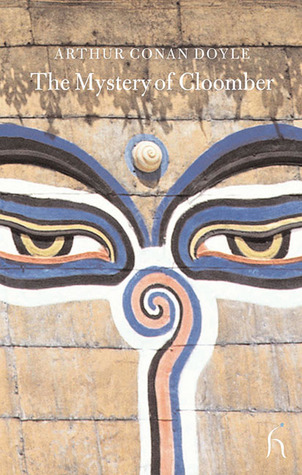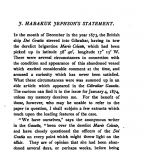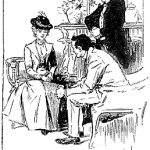Copied and authenticated by the Reverend Mathew Clark, Presbyterian Minister of Stoneykirk, in Wigtownshire)

Maister Fothergill West and the meenister say that I maun tell all I can aboot General Heatherstone and his hoose, but that I maunna say muckle aboot mysel’ because the readers wouldna care to hear aboot me or my affairs. I am na sae sure o’ that, for the Stakes is a family weel kenned and respecked on baith sides o’ the Border, and there’s mony in Nithsdale and Annandale as would be gey pleased to hear news o’ the son o’ Archie Stakes, o’ Ecclefechan.
I maun e’en do as I’m tauld, however, for Mr. West’s sake, hoping he’ll no forget me when I chance to hae a favour tae ask.(1) I’m no able tae write mysel’ because my feyther sent me oot to scare craws instead o’ sendin’ me tae school, but on the ither hond he brought me up in the preenciples and practice o’ the real kirk o’ the Covenant, for which may the Lord be praised!
It way last May twel’month that the factor body, Maister McNeil, cam ower tae me in the street and speered whether I was in want o’ a place as a coachman and gairdner. As it fell oot I chanced tae be on the look oot for something o’ the sort mysel’ at the time, but I wasna ower quick to let him see that I wanted it.
“Ye can tak it or leave it,” says he sharp like. “It’s a guid place, and there’s mony would be glad o’t. If ye want it ye can come up tae my office at twa the morn and put your ain questions tae the gentleman.”
That was a’ I could get frae him, for he’s a close man and a hard one at a bargain—which shall profit him leetle in the next life, though he lay by a store o’ siller in this. When the day comes there’ll be a hantle o’ factors on the left hand o’ the throne, and I shouldna be surprised if Maister McNeil found himsel’ amang them.
Weel, on the morn I gaed up to the office and there I foond the factor and a lang, thin, dour man wi’ grey hair and a face as brown and crinkled as a walnut. He looked hard at me wi’ a pair o’ een that glowed like twa spunks, and then he says, says he:
“You’ve been born in these pairts, I understan’?”
“Aye,” says I, “and never left them neither.”
“Never been oot o’ Scotland?” he speers.
“Twice to Carlisle fair,” says I, for I am a man wha loves the truth; and besides I kenned that the factor would mind my gaeing there, for I bargained fur twa steers and a stirk that he wanted for the stockin’ o’ the Drumleugh Fairm.
“I learn frae Maister McNeil,” says General Heatherstone—for him it was and nane ither—”that ye canna write.”
“Na,” says I.
“Nor read?”
“Na,” says I.
“It seems tae me,” says he, turnin’ tae the factor, “that this is the vera man I want. Servants is spoilt noo-a-days,” says he, “by ower muckle eddication. I hae nae doobt, Stakes, that ye will suit me well enough. Ye’ll hae three pund a month and a’ foond, but I shall resairve the right o’ givin’ ye twenty-four hoors’ notice at any time. How will that suit ye?”
“It’s vera different frae my last place,” says I, discontented-like.
And the words were true enough, for auld Fairmer Scott only gave me a pund a month and parritch twice a day.
“Weel, weel,” says he, “maybe we’ll gie ye a rise if ye suit. Meanwhile here’s the han’sel shillin’ that Maister McNeil tells me it’s the custom tae give, and I shall expec’ tae see ye at Cloomber on Monday.”
When the Monday cam roond I walked oot tae Cloomber, and a great muckle hoose it is, wi’ a hunderd windows or mair, and space enough tae hide awa’ half the parish.
As tae gairdening, there was no gairden for me tae work at, and the horse was never taken oot o’ the stables frae week’s end tae week’s end. I was busy enough for a’ that, for there was a deal o’ fencing tae be put up, and one thing or anither, forbye cleanin’ the knives and brushin’ the boots and such-like jobs as is mair fit for an auld wife than for a grown man.
There was twa besides mysel’ in the kitchen, the cook Eliza, and Mary the hoosemaid, puir, benighted beings baith o’ them, wha had wasted a’ their lives in London, and kenned leetle aboot the warld or the ways o’ the flesh.
I hadna muckle tae say to them, for they were simple folk who could scarce understand English, and had hardly mair regard for their ain souls than the tods on the moor. When the cook said she didna think muckle o’ John Knox, and the ither that she wouldna give saxpence tae hear the discourse o’ Maister Donald McSnaw o’ the true kirk, I kenned it was time for me tae leave them tae a higher Judge.
There was four in family, the general, my leddy, Maister Mordaunt, and Miss Gabriel, and it wasna long before I found that a’ wasna just exactly as it should be. My leddy was as thin and as white as a ghaist, and many’s the time as I’ve come on her and found her yammerin’ and greetin’ all by hersel’. I’ve watched her walkin’ up and doon in the wood where she thought nane could see her and wringin’ her honds like one demented.
There was the young gentleman, tae, and his sister—they baith seemed to hae some trouble on their minds, and the general maist of a’, for the ithers were up ane day and down anither; but he was aye the same, wi’ a face as dour and sad as a felon when he feels the tow roond his neck.
I speered o’ the hussies in the kitchen whether they kenned what was amiss wi’ the family, but the cook she answered me back that it wasna for her tae inquire into the affairs o’ her superiors, and that it was naething to her as long as she did her work and had her wages. They were puir, feckless bodies, the twa o’ them, and would scarce gie an answer tae a ceevil question, though they could clack lood eneugh when they had a mind.
Weel, weeks passed into months and a’ things grew waur instead o’ better in the Hall. The general he got mair nairvous, and his leddy mair melancholy every day, and yet there wasna any quarrel or bickering between them, for when they’ve been togither in the breakfast room I used often tae gang round and prune the rose-tree alongside o’ the window, so that I couldna help hearin’ a great pairt o’ their conversation, though sair against the grain.
When the young folk were wi’ them they would speak little, but when they had gone they would aye talk as if some waefu’ trial ere aboot to fa’ upon them, though I could never gather from their words what it was that they were afeared o’.
I’ve heard the general say mair than ance that he wasna frighted o’ death, or any danger that he could face and have done wi’, but that it was the lang, weary waitin’ and the uncertainty that had taken a’ the strength and the mettle oot o’ him. Then my leddy would console him and tell him that maybe it wasna as bad as he thocht, and that a’ would come richt in the end—but a’ her cheery words were clean throwed away upon him.
As tae the young folks, I kenned weel that they didna bide in the groonds, and that they were awa’ whenever they got a chance wi’ Maister Fothergill West tae Branksome, but the general was too fu’ o’ his ain troubles tae ken aboot it, and it didna seem tae me that it was pairt o’ my duties either as coachman or as gairdner tae mind the bairns. He should have lairnt that if ye forbid a lassie and a laddie to dae anything it’s just the surest way o’ bringin’ it aboot. The Lord foond that oot in the gairden o’ Paradise, and there’s no muckle change between the folk in Eden and the folk in Wigtown.
There’s ane thing that I havena spoke aboot yet, but that should be set doon.
The general didna share his room wi’ his wife, but slept a’ alane in a chamber at the far end o’ the hoose, as distant as possible frae every one else. This room was aye lockit when he wasna in it, and naebody was ever allowed tae gang into it. He would mak’ his ain bed, and red it up and dust it a’ by himsel’, but he wouldna so much as allow one o’ us to set fut on the passage that led tae it.
At nicht he would walk a’ ower the hoose, and he had lamps hung in every room and corner, so that no pairt should be dark.
Many’s the time frae my room in the garret I’ve heard his futsteps comin’ and gangin’, comin’ and gangin’ doon one passage and up anither frae midnight till cockcraw. It was weary wark to lie listenin’ tae his clatter and wonderin’ whether he was clean daft, or whether maybe he’d lairnt pagan and idolatrous tricks oot in India, and that his conscience noo was like the worm which gnaweth and dieth not. I’d ha’ speered frae him whether it wouldna ease him to speak wi’ the holy Donald McSnaw, but it might ha’ been a mistake, and the general wasna a man that you’d care tae mak’ a mistake wi’.
Ane day I was workin’ at the grass border when he comes up and he says, says he:
“Did ye ever have occasion tae fire a pistol, Israel?”
“Godsakes!” says I, “I never had siccan a thing in my honds in my life.”
“Then you’d best not begin noo,” says he. “Every man tae his ain weepon,” he says. “Now I warrant ye could do something wi’ a guid crab-tree cudgel!”
“Aye, could I,” I answered blithely, “as well as ony lad on the Border.”
“This is a lonely hoose,” says he, “and we might be molested by some rascals. It’s weel tae be ready for whatever may come. Me and you and my son Mordaunt and Mr. Fothergill West of Branksome, who would come if he was required, ought tae be able tae show a bauld face—what think ye?”
“‘Deed, sir,” I says, “feastin’ is aye better than fechtin’—but if ye’ll raise me a pund a month, I’ll no’ shirk my share o’ either.”
“We won’t quarrel ower that,” says he, and agreed tae the extra twal’ pund a year as easy as though it were as many bawbees. Far be it frae me tae think evil, but I couldna help surmisin’ at the time that money that was so lightly pairted wi’ was maybe no’ so very honestly cam by.
I’m no’ a curious or a pryin’ mun by nature, but I was sair puzzled in my ain mind tae tell why it was that the general walked aboot at nicht and what kept him frae his sleep.
Weel, ane day I was cleanin’ doon the passages when my e’e fell on a great muckle heap o’ curtains and auld cairpets and sic’ like things that were piled away in a corner, no vera far frae the door o’ the general’s room. A’ o’ a sudden a thocht came intae my heid and I says tae mysel’:
“Israel, laddie,” says I, “what’s tae stop ye frae hidin’ behind that this vera nicht and seein’ the auld mun when he doesna ken human e’e is on him?”
The mair I thocht o’t the mair seemple it appeared, and I made up my mind tae put the idea intae instant execution.
When the nicht cam roond I tauld the women-folk that I was bad wi’ the jawache, and would gang airly tae my room. I kenned fine when ance I got there that there was na chance o’ ony ane disturbin’ me, so I waited a wee while, and then when a’ was quiet, I slippit aff my boots and ran doon the ither stair until I cam tae the heap o’ auld clothes, and there I lay doon wi’ ane e’e peepin’ through a kink and a’ the rest covered up wi’ a great, ragged cairpet.
There I bided as quiet as a mouse until the general passed me on his road tae bed, and a’ was still in the hoose.
My certie! I wouldna gang through wi’ it again for a’ the siller at the Union Bank of Dumfries, I canna think o’t noo withoot feelin’ cauld a’ the way doon my back.
It was just awfu’ lyin’ there in the deid silence, waitin’ and waitin’ wi’ never a soond tae break the monotony, except the heavy tickin’ o’ an auld clock somewhere doon the passage.
First I would look doon the corridor in the one way, and syne I’d look doon in t’ither, but it aye seemed to me as though there was something coming up frae the side that I wasna lookin’ at. I had a cauld sweat on my broo, and my hairt was beatin’ twice tae ilka tick o’ the clock, and what feared me most of a’ was that the dust frae the curtains and things was aye gettin’ doon intae my lungs, and it was a’ I could dae tae keep mysel’ frae coughin’.
Godsakes! I wonder my hair wasna grey wi’ a’ that I went through. I wouldna dae it again to be made Lord Provost o’ Glasgie.
Weel, it may have been twa o’clock in the mornin’ or maybe a little mair, and I was just thinkin’ that I wasna tae see onything after a’—and I wasna very sorry neither—when all o’ a sudden a soond cam tae my ears clear and distinct through the stillness o’ the nicht.
I’ve been asked afore noo tae describe that soond, but I’ve aye foond that it’s no’ vera easy tae gie a clear idea o’t, though it was unlike any other soond that ever I hearkened tae. It was a shairp, ringin’ clang, like what could be caused by flippin’ the rim o’ a wineglass, but it was far higher and thinner than that, and had in it, tae, a kind o’ splash, like the tinkle o’ a rain-drop intae a water-butt.
In my fear I sat up amang my cairpets, like a puddock among gowan-leaves, and I listened wi’ a’ my ears. A’ was still again noo, except for the dull tickin’ o’ the distant clock.
Suddenly the soond cam again, as clear, as shrill, as shairp as ever, and this time the general heard it, for I heard him gie a kind o’ groan, as a tired man might wha has been roosed oot o’ his sleep.
He got up frae his bed, and I could make oot a rustling noise, as though he were dressin’ himsel’, and presently his footfa’ as he began tae walk up and doon in his room.
Mysakes! it didna tak lang for me tae drap doon amang the cairpets again and cover mysel’ ower. There I lay tremblin’ in every limb, and sayin’ as mony prayers as I could mind, wi’ my e’e still peepin’ through the keek-hole, and’ fixed upon the door o’ the general’s room.
I heard the rattle o’ the handle presently, and the door swung slowly open. There was a licht burnin’ in the room beyond, an’ I could just catch a glimpse o’ what seemed tae me like a row o’ swords stuck alang the side o’ the wa’, when the general stepped oot and shut the door behind him. He was dressed in a dressin’ goon, wi’ a red smokin’-cap on his heid, and a pair o’ slippers wi’ the heels cut off and the taes turned up.
For a moment it cam into my held that maybe he was walkin’ in his sleep, but as he cam towards me I could see the glint o’ the licht in his e’en, and his face was a’ twistin’, like a man that’s in sair distress o’ mind. On my conscience, it gies me the shakes noo when I think o’ his tall figure and his yelley face comin’ sae solemn and silent doon the lang, lone passage.
I haud my breath and lay close watchin’ him, but just as he cam tae where I was my vera hairt stood still in my breast, for “ting!”—loud and clear, within a yaird o’ me cam the ringin’, clangin’ soond that I had a’ready hairkened tae.
Where it cam frae is mair than I can tell or what was the cause o’t. It might ha’ been that the general made it, but I was sair puzzled tae tell hoo, for his honds were baith doon by his side as he passed me. It cam frae his direction, certainly, but it appeared tae me tae come frae ower his heid, but it was siccan a thin, eerie, high-pitched, uncanny kind o’ soond that it wasna easy tae say just exactly where it did come frae.
The general tuk nae heed o’t, but walked on and was soon oot o’ sicht, and I didna lose a minute in creepin’ oot frae my hidin’ place and scamperin’ awa’ back tae my room, and if a’ the bogies in the Red Sea were trapesin’ up and doon the hale nicht through, I wud never put my heid oot again tae hae a glimpse o’ them.
I didna say a word tae anybody aboot what I’d seen, but I made up my mind that I wudna stay muckle langer at Cloomber Ha’. Four pund a month is a good wage, but it isna enough tae pay a man for the loss o’ his peace o’ mind, and maybe the loss o’ his soul as weel, for when the deil is aboot ye canna tell what sort o’ a trap he may lay for ye, and though they say that Providence is stronger than him, it’s maybe as weel no’ to risk it.
It was clear tae me that the general and his hoose were baith under some curse, and it was fit that that curse should fa’ on them that had earned it, and no’ on a righteous Presbyterian, wha had ever trod the narrow path.
My hairt was sair for young Miss Gabriel—for she was a bonnie and winsome lassie—but for a’ that, I felt that my duty was tae mysel’ and that I should gang forth, even as Lot ganged oot o’ the wicked cities o’ the plain.
That awfu’ cling-clang was aye dingin’ in my lugs, and I couldna bear to be alane in the passages for fear o’ hearin’ it ance again. I only wanted a chance or an excuse tae gie the general notice, and tae gang back to some place where I could see Christian folk, and have the kirk within a stone-cast tae fa’ back upon.
But it proved tae be ordained that, instead o’ my saying the word, it should come frae the general himsel’.
It was ane day aboot the beginning of October, I was comin’ oot o’ the stable, after giein’ its oats tae the horse, when I seed a great muckle loon come hoppin’ on ane leg up the drive, mair like a big, ill-faured craw than a man.
When I clapped my een on him I thocht that maybe this was ane of the rascals that the maister had been speakin’ aboot, so withoot mair ado I fetched oot my bit stick with the intention o’ tryin’ it upon the limmer’s heid. He seed me comin’ towards him, and readin’ my intention frae my look maybe, or frae the stick in my hand, he pu’ed oot a lang knife frae his pocket and swore wi’ the most awfu’ oaths that if I didna stan’ back he’d be the death o’ me.
Ma conscience! the words the chiel used was eneugh tae mak’ the hair stand straight on your heid. I wonder he wasna struck deid where he stood.
We were still standin’ opposite each ither—he wi’ his knife and me wi’ the stick—when the general he cam up the drive and foond us. Tae my surprise he began tae talk tae the stranger as if he’d kenned him a’ his days.
“Put your knife in your pocket, Corporal,” says he. “Your fears have turned your brain.”
“Blood an’ wounds!” says the other. “He’d ha’ turned my brain tae some purpose wi’ that muckle stick o’ his if I hadna drawn my snickersnee. You shouldna keep siccan an auld savage on your premises.”
The maister he frooned and looked black at him, as though he didna relish advice comin’ frae such a source. Then turnin’ tae me—”You won’t be wanted after to-day, Israel,” he says; “you have been a guid servant, and I ha’ naething tae complain of wi’ ye, but circumstances have arisen which will cause me tae change my arrangements.”
“Vera guid, sir,” says I.
“You can go this evening,” says he, “and you shall have an extra month’s pay tae mak up t’ye for this short notice.”
Wi’ that he went intae the hoose, followed by the man that he ca’ed the corporal, and frae that day tae this I have never clapped een either on the ane or the ither. My money was sent oot tae me in an envelope, and havin’ said a few pairtin’ words tae the cook and the wench wi’ reference tae the wrath tae come and the treasure that is richer than rubies, I shook the dust o’ Cloomber frae my feet for ever.
Maister Fothergill West says I maunna express an opeenion as tae what cam aboot afterwards, but maun confine mysel’ tae what I saw mysel’. Nae doubt he has his reasons for this—and far be it frae me tae hint that they are no’ guid anes—but I maun say this, that what happened didna surprise me. It was just as I expeckit, and so I said tae Maister Donald McSnaw.
I’ve tauld ye a’ aboot it noo, and I havena a word tae add or tae withdraw. I’m muckle obleeged tae Maister Mathew Clairk for puttin’ it a’ doon in writin’ for me, and if there’s ony would wish tae speer onything mair o’ me I’m well kenned and respeckit in Ecclefechan, and Maister McNeil, the factor o’ Wigtown, can aye tell where I am tae be foond.
(1) The old rascal was well paid for his trouble, so he need not have made such a favour of it.—J.F.W.



